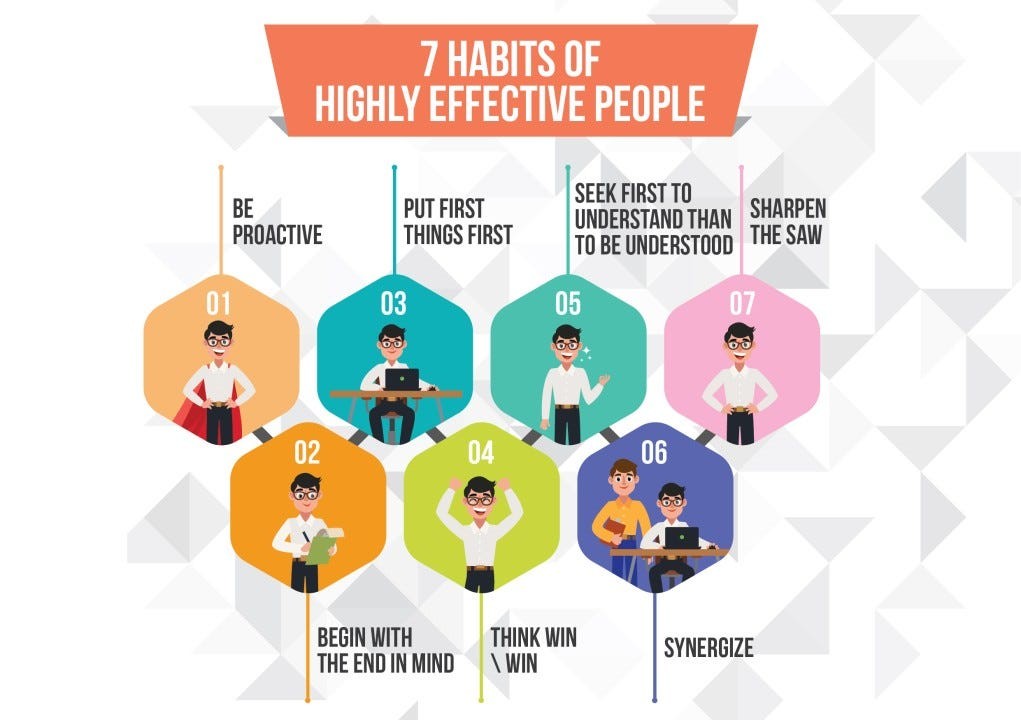In the world of self-improvement literature, few books have made as profound an impact as “The 7 Habits of Highly Effective People” by Stephen R. Covey. Published in 1989, this timeless classic has transformed the lives of millions, offering practical wisdom to achieve personal and professional success. Whether you are a student, a professional, or someone seeking a more meaningful life, these seven habits can guide you.
Understanding the Core of the Book
Stephen Covey’s “The 7 Habits of Highly Effective People” is not just about quick fixes or surface-level solutions. It is a guide to developing a character-based approach to success and effectiveness. Covey emphasizes principles like responsibility, integrity, and continuous growth as foundational elements of effectiveness.
Habit 1: Be Proactive
“You are not a product of your circumstances. You are a product of your decisions.”
Covey starts with a fundamental idea – proactivity. Being proactive means taking responsibility for your life and actions. Instead of reacting to situations, proactive people make conscious choices based on their values. It is about recognizing that you have the power to shape your own destiny.
How to Practice Proactivity:
- Focus on what you can control (your “Circle of Influence”) rather than what you cannot (your “Circle of Concern”).
- Replace reactive language (“I can’t”, “I have to”) with proactive language (“I choose”, “I will”).
Habit 2: Begin with the End in Mind
“Start with a clear understanding of your destination.”
This habit is about vision. Covey suggests creating a personal mission statement that reflects your values and long-term goals. When you know where you want to go, you can make decisions that align with that vision.
How to Apply:
- Write a personal mission statement.
- Define your life roles and prioritize them.
Habit 3: Put First Things First
“Organize and execute around your most important priorities.”
Covey introduces the concept of time management with a focus on effectiveness over mere efficiency. It is about identifying what is most important and ensuring those priorities get the necessary time and attention.
How to Practice:
- Use Covey’s Time Management Matrix (Urgent vs. Important).
- Prioritize tasks in Quadrant II (Important but Not Urgent).
Habit 4: Think Win-Win
“There is plenty for everyone.”
This habit is about developing an abundance mindset. In any interaction, seek solutions that benefit both parties, fostering trust and strong relationships.
How to Apply:
- Approach negotiations with a win-win mindset.
- Cultivate an abundance mentality rather than a scarcity mindset.
Habit 5: Seek First to Understand, Then to Be Understood
“Listen with the intent to understand, not to reply.”
Covey emphasizes the importance of empathetic communication. Most people listen with the intent to reply, but true communication begins with understanding the other person’s perspective.
How to Practice:
- Develop active listening skills.
- Practice empathetic communication in daily interactions.
Habit 6: Synergize
“The whole is greater than the sum of its parts.”
This habit highlights the power of teamwork and collaboration. When people work together, their combined strengths can create something greater than they could achieve alone.
How to Apply:
- Embrace diversity and value different perspectives.
- Collaborate with others to find creative solutions.
Habit 7: Sharpen the Saw
“Preserve and enhance the greatest asset you have – yourself.”
Covey encourages continuous self-renewal in four areas: physical, mental, emotional, and spiritual. This habit ensures that you maintain your effectiveness over time.
How to Practice:
- Regularly engage in activities that renew you in all four areas.
- Prioritize self-care as part of your daily routine.
Final Thoughts on The 7 Habits of Highly Effective People
“The 7 Habits of Highly Effective People” is more than just a book. It is a timeless guide to personal and professional effectiveness. By internalizing these seven habits, you can transform your mindset, improve your relationships, and achieve lasting success.
Are you ready to make these habits a part of your life? Start small, be consistent, and watch how your life changes.
Want to explore more personal development tips? Check out our other articles:
- Top 5 Books for Personal Growth
- How to Build a Morning Routine that Transforms Your Life
- Mastering Time Management for Success




Stephen Covey’s “The 7 Habits of Highly Effective People” offers a profound approach to personal and professional growth. I appreciate how Covey emphasizes character over quick fixes, which feels refreshing in today’s fast-paced world. The idea of proactivity resonates deeply—it’s empowering to think we can shape our own destiny through conscious choices. The focus on creating a personal mission statement is intriguing; it seems like a powerful tool for staying aligned with one’s values. I wonder, though, how one can balance this level of self-discipline with the unpredictability of life? The concept of an abundance mindset is inspiring, but how do you apply it in highly competitive environments? Overall, this book seems like a must-read for anyone serious about growth. What’s your take on Covey’s approach—do you think it’s universally applicable, or does it require specific conditions to work?